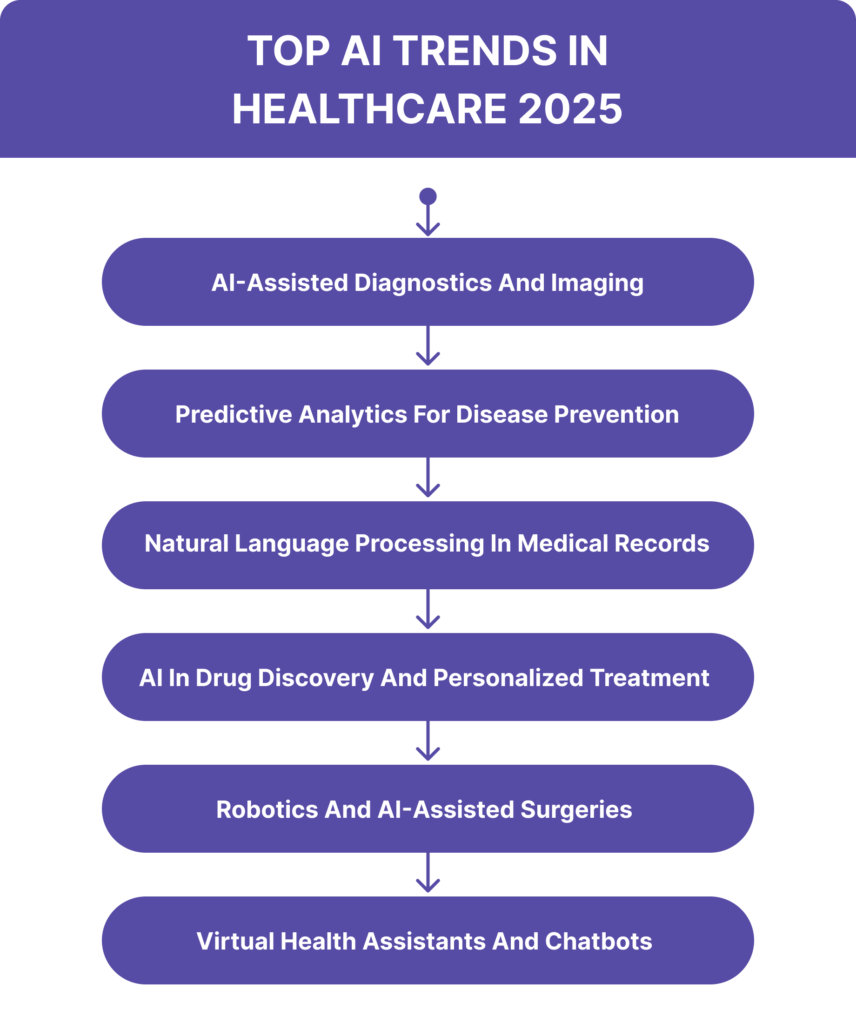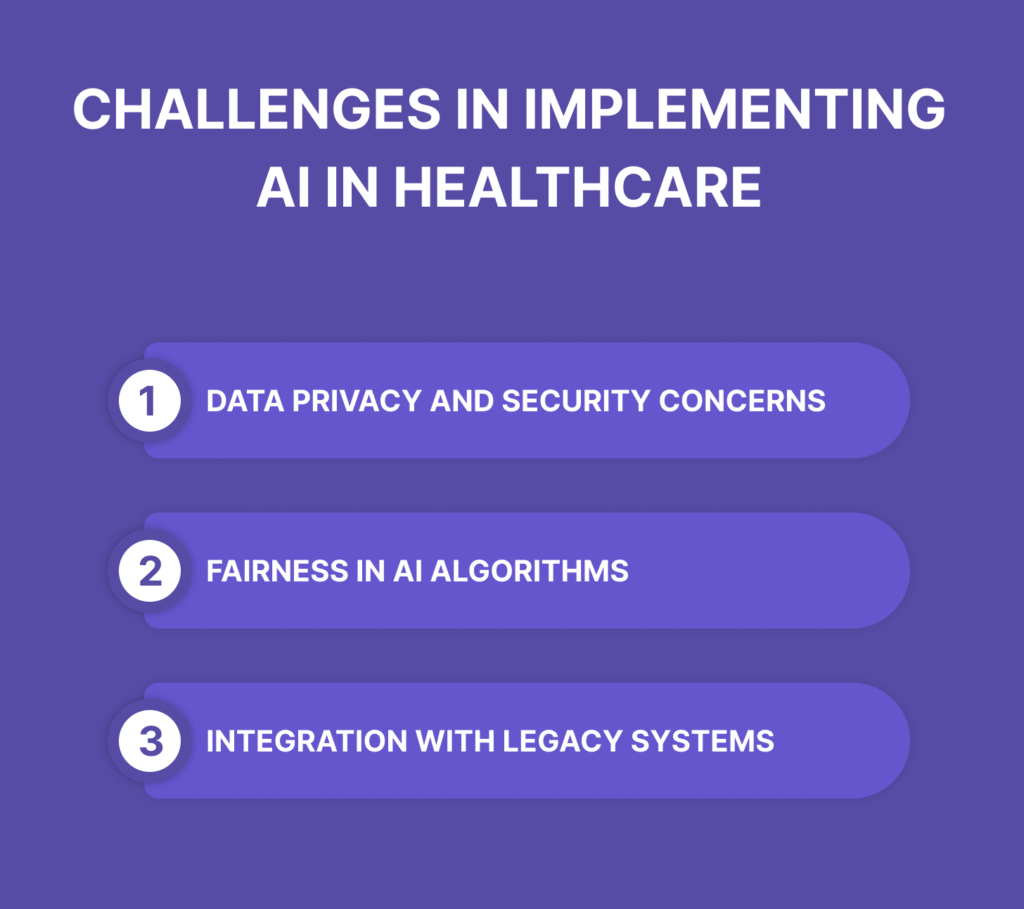Artificial Intelligence (AI) is transforming the healthcare industry faster than ever. From improving diagnostics to automating patient care, AI is playing a key role in shaping the future of medicine. As we enter into 2025, keeping up with the latest AI trends in healthcare is more important than ever for doctors, hospitals, researchers, and tech developers.
The rise of artificial intelligence in healthcare 2025 is not just about new tools—it’s about changing the way we approach patient treatment, data management, and clinical decision-making. Technologies like machine learning in healthcare, predictive analytics, and AI-powered healthcare solutions are making systems smarter and more efficient.
In this blog, we’ll explore the top healthcare technology trends you should watch in 2025 and how AI in medical diagnostics and beyond is revolutionizing the medical world.
Why AI Matters in Modern Healthcare?
Artificial Intelligence (AI) is no longer a futuristic concept–it’s a vital part of today’s healthcare system. As we explore key AI trends in healthcare, it’s clear that AI is transforming how medical professionals diagnose, treat, and manage patients.
One of the biggest benefits of artificial intelligence in healthcare is its ability to enhance patient care. AI tools can quickly analyze large volumes of medical data, helping doctors make faster and more accurate decisions. From detecting diseases at early stages to personalizing treatment plans, AI is improving outcomes and saving lives.
According to a recent study by Accenture, AI applications could save the U.S. healthcare system up to $150 billion annually by 2026. These savings come from increased efficiency in medical workflows, reduced diagnostic errors, and automated administrative tasks like billing and patient record management.
In real-world settings, AI in medical diagnostics has already shown remarkable results. For example, AI algorithms can detect certain cancers, such as breast or lung cancer, with accuracy that rivals or exceeds that of human radiologists. Additionally, machine learning in healthcare helps predict patient risks and suggest preventative measures before conditions worsen.
With these clear advantages, it’s no surprise that AI-powered healthcare solutions are becoming central to modern healthcare strategies. Understanding these innovations is essential for anyone involved in medicine, health tech, or hospital administration.
Top AI Trends in Healthcare 2025
What are the top AI trends in healthcare for 2025?
In 2025, healthcare is witnessing major AI advancements including predictive analytics, machine learning-powered diagnostics, AI in drug discovery, NLP for medical records, and robotics in surgery. Each of these trends plays a unique role in improving patient care and operational efficiency.
Below are the top AI trends in healthcare that are driving innovation, improving patient care, and reshaping the future of medicine.

1) AI-Assisted Diagnostics and Imaging
One of the most transformative AI trends in healthcare is the use of machine learning to enhance diagnostic accuracy. AI algorithms now assist in interpreting medical images such as X-rays, MRIs, and CT scans with speed and precision, reducing diagnostic errors and improving patient outcomes.
2) Predictive Analytics for Disease Prevention
AI-driven predictive analytics are reshaping preventative care. By analyzing patient history, genetic data, and lifestyle factors, AI helps forecast potential health risks, enabling earlier interventions and personalized wellness strategies—key innovations among AI trends in healthcare.
3) Natural Language Processing in Medical Records
Natural Language Processing (NLP) enables AI systems to read and understand unstructured clinical notes, patient histories, and EHRs. This advancement is streamlining documentation, enhancing data accessibility, and improving physician workflows across the healthcare system.
4) AI in Drug Discovery and Personalized Treatment
AI is accelerating drug discovery by simulating clinical trials, analyzing complex datasets, and identifying promising compounds faster than traditional methods. It’s also enabling personalized treatment plans based on genetic and lifestyle data—an emerging highlight in AI trends in healthcare.
5) Robotics and AI-Assisted Surgeries
AI-integrated surgical robots are elevating precision in the operating room. These systems can assist surgeons in real-time, improving accuracy, reducing surgical trauma, and speeding up recovery—marking a significant evolution in the intersection of AI trends in healthcare and surgical innovation.
6) Virtual Health Assistants and Chatbots
Virtual assistants and medical chatbots powered by AI are transforming patient engagement. These tools provide 24/7 health advice, appointment scheduling, medication reminders, and even mental health support—making healthcare more accessible and efficient for all.
Country-Specific AI Adoption in Healthcare
AI adoption is accelerating worldwide, but approaches vary across regions. The U.S. is leading in AI-driven medical imaging and digital health startups, while the UK is integrating AI into public health systems.
Countries like China and India are embracing AI-powered healthcare solutions to address large-scale accessibility issues. Understanding regional trends provides a global view of the future of Healthcare AI, showing how innovation adapts to different challenges and healthcare infrastructures.
What role does machine learning play in healthcare in 2025?
Machine learning is central to healthcare in 2025, powering tools that personalize treatment, identify health risks, and automate routine clinical tasks. It turns complex health data into actionable insights that improve care quality and efficiency.
Challenges in Implementing AI in Healthcare
While AI trends in healthcare are bringing big improvements, using AI in real hospitals and clinics isn’t always easy. As Artificial Intelligence in Healthcare 2025 becomes more common, there are still a few key challenges that need to be solved to make it work safely and fairly for everyone.

1) Data Privacy and Security Concerns
AI systems need lots of health data to work well—but this data is private and sensitive. There are real concerns about how to keep patient information safe from hackers or leaks. Healthcare providers must follow strict rules, like HIPAA, and use secure systems to protect this data while using AI to improve care.
2) Fairness in AI Algorithms
If an AI system is trained using limited or unbalanced data, it can make incorrect or unfair decisions. For example, it might not work as well for people from different backgrounds or age groups. To make AI in healthcare helpful for everyone, it’s important to use a wide range of data and carefully review how the AI is trained and how it makes decisions.
3) Integration with Legacy Systems
Many healthcare institutions still depend on outdated infrastructure, making it challenging to integrate advanced AI technologies. Compatibility issues with legacy EHRs, hardware limitations, and a shortage of trained staff slow down the adoption of the future of Healthcare AI. For AI to be effective at scale, it must seamlessly work with existing systems while also pushing them forward.
Future Outlook: What’s Next for AI in Medicine?
As we look ahead, the future of AI trends in healthcare isn’t just promising—it’s revolutionary. From smarter machines to stronger rules and deeper ethical thinking, here’s a quick look at what’s coming next in the AI-powered medical world.
1) Smart Tech, Better Care
AI is getting faster, sharper, and more human-like. Imagine AI systems that not only diagnose but predict illnesses before symptoms appear. Think wearable devices that track health in real-time, and AI tools that help create new medicines in weeks—not years. These aren’t futuristic fantasies—they’re the next wave of healthcare innovations.
2) Enhancing Patient Safety Through AI Regulations
As AI takes a bigger role in healthcare, new rules are being developed to protect patients. These regulations will guide how AI systems are tested and approved, ensure transparency in AI decision-making, and safeguard sensitive patient data. The goal is to make sure AI tools are reliable, fair, and safe before they are used in medical settings—ultimately putting patient safety first.
3) Ethics and AI: Keeping Care Fair for Everyone
AI is here to help doctors, not take their place. One big goal for AI in healthcare is to make sure it treats all people fairly—no matter their age, gender, skin color, or background. It’s about earning trust while still using new technology to improve care.
4) Looking Forward: Building a Better Future with AI in Healthcare
Hospitals, startups, and tech experts all need to work together. By keeping up with new AI developments, following important safety rules, and focusing on what patients need, we can make healthcare smarter, safer, and more caring than ever before.
Conclusion
The future of AI trends in healthcare is full of potential to transform how we prevent, diagnose, and treat diseases. As technology grows smarter and regulations strengthen, it’s crucial to balance innovation with patient safety and fairness. Success will depend on collaboration between healthcare providers, tech developers, and policymakers, all working together to build AI systems that truly serve people. By focusing on ethical use and real-world needs, AI trends in healthcare can help create a healthcare system that is faster, more accurate, and truly patient-centered.